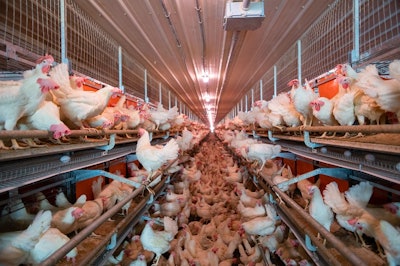
The use of smoke detectors as a solution to fires in poultry houses was discussed by Brett Cohrs, Palomar Insurance Sr. Vice President, and Ross Milne, Cottingham & Butler Risk Management Consultant, in an interview with Egg Industry Insight.
In recent years, the U.S. egg industry has experienced numerous large fires that have caused severe damage and loss of birds. As a result, producers and insurance companies have explored fire detection solutions, such as smoke detectors, to help mitigate the problem.
According to Cohrs, it is not standard for smoke detectors or sprinkler systems to be in poultry houses.
Cohrs continued, “If there were a tested and viable smoke or early fire detection system, hopefully that would result in fewer losses, and insurance companies could respond with rate improvement and more generous coverage features.”
Smoke detector placement
Some of the major concerns with smoke detectors in poultry houses are false alarms due to dust or dander and equipment in the house preventing smoke from reaching detection systems in a timely manner.
Milnes speculated that mounting several smoke detectors at various levels would be the most effective way to place them. However, this could potentially become cost prohibitive depending on the number of detectors used per house.
“It's not just as simple as putting a smoke detector on the ceiling,” he added.
Early detection
Cohrs stated: “Monitoring and poultry management system vendors have been developing technologies capable of early smoke or electrical fault detection. I’m hopeful that these technologies can effectively differentiate between smoke from a fire and the environmental dust of a layer house to initiate notification and ventilation changes as needed.”
Mitigating the spread of a potential fire through early notification could help prevent the complete loss of a poultry house.
Cohrs added, “Investing in this kind of system would help build a better story for producers who want coverage, improving insurability, costs, and policy features over time.”
















